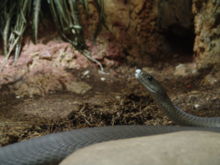Mamba
| Dendroaspis | |
|---|---|
 |
|
| Black mamba | |
| Scientific classification | |
| Kingdom: | Animalia |
| Phylum: | Chordata |
| Subphylum: | Vertebrata |
| Class: | Reptilia |
| Order: | Squamata |
| Suborder: | Serpentes |
| Family: | Elapidae |
| Genus: |
Dendroaspis Schlegel, 1848 |
| Species | |
Mambas are fast-moving venomous snakes of the genus Dendroaspis (which literally means "tree asp") in the family Elapidae. Four extant species are recognised currently; three of those four species are essentially arboreal and green in colour, whereas the so-called black mamba, Dendroaspis polylepis, is largely terrestrial and generally brown or grey in colour. All are native to various regions in sub-Saharan Africa and all are feared throughout their ranges, especially the black mamba. In Africa there are many legends and stories about mambas.
The three species of green mambas are arboreal, whereas the black mamba is largely terrestrial. All four species are active diurnal hunters, preying on birds, lizards, and small mammals. At nightfall some species, especially the terrestrial black mamba, shelter in a lair. A mamba may retain the same lair for years.
Mambas and cobras are in the same family: the Elapidae. Like cobras, a mamba may rear and form a hood as part of its threat display, but the mamba's hood is narrower and is longer than the broader hood of some species of cobra, such as say, the spectacled cobras of parts of Asia. In their threat display mambas commonly gape; the black mamba's mouth is black within, which renders the threat more conspicuous. Typically also, a rearing mamba tends to lean well forward, instead of standing erect as a cobra does.
Stories of black mambas that chase and attack humans are common, but in fact the snakes generally avoid contact with humans. Most apparent cases of pursuit probably are examples of where witnesses have mistaken the snake's attempt to retreat to its lair when a human happens to be in the way. The black mamba usually uses its speed to escape from threats, and humans actually are their main predators, rather than prey.
...
Wikipedia
